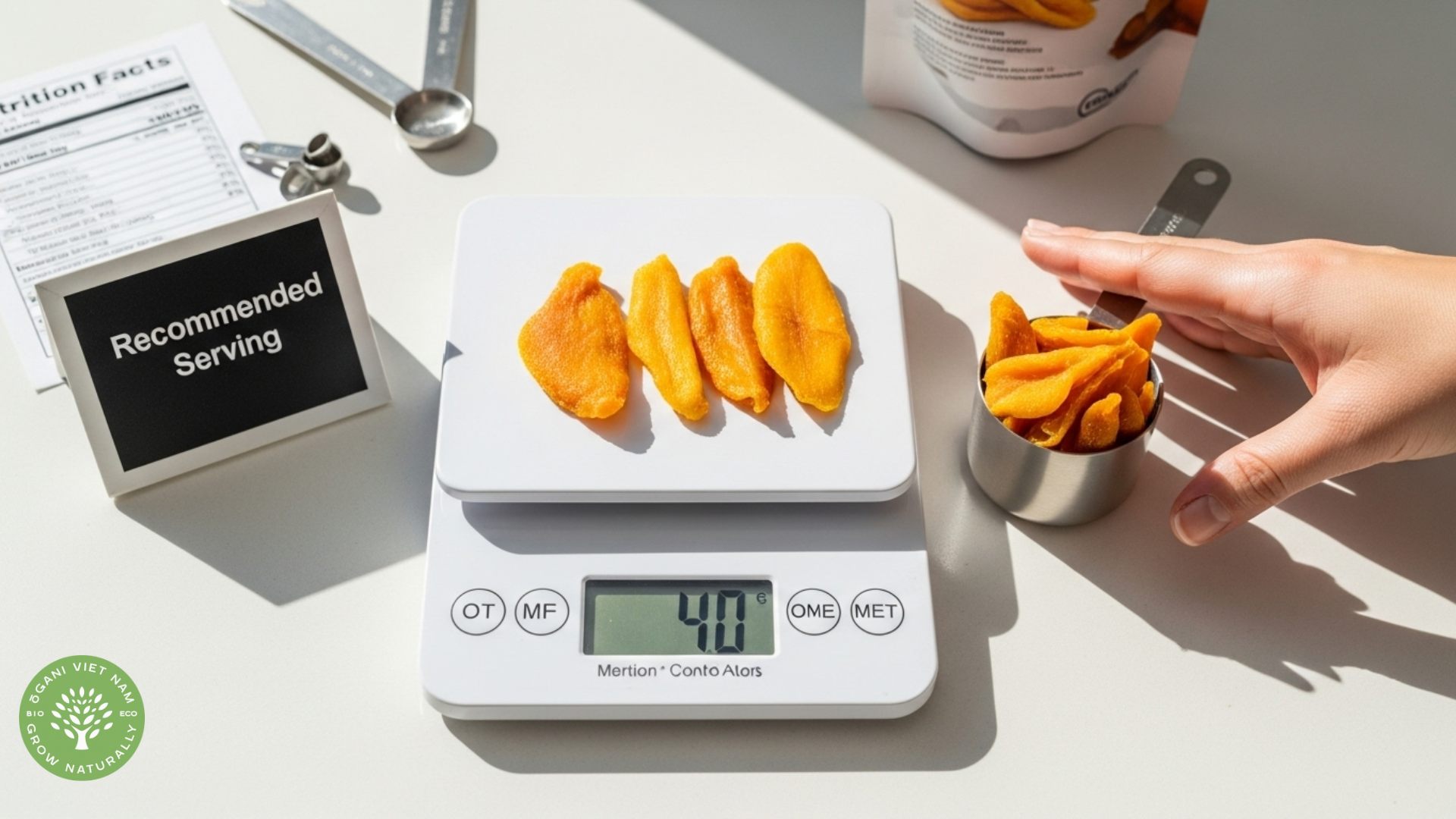
Are dry mangoes healthy? Yes, when chosen wisely and eaten in moderation, dried mangoes offer valuable nutrients like vitamins and fiber, but they’re also higher in sugar and calories than fresh fruit. At Ogani VN, we believe understanding both the benefits and limitations helps you make the best choices for your health.
Are dry mangoes healthy? The nutritional powerhouse revealed
When you bite into a piece of dried mango, you’re getting more than just a sweet treat. These chewy golden slices pack a surprising nutritional punch that fresh fruit lovers often overlook.
Dried mangoes contain concentrated amounts of vitamin A, which supports healthy vision and immune function. A single serving provides about 25% of your daily vitamin A needs – that’s more than most people get from their regular diet. The drying process actually preserves many of the original nutrients found in fresh mangoes, just in a more concentrated form.
The fiber content deserves special attention too. Each serving delivers around 3 grams of dietary fiber, supporting digestive health and helping you feel satisfied longer. This natural fiber also plays a role in stabilizing blood sugar levels, which is particularly important given the natural sugar content.
What makes dried mangoes healthy from an antioxidant perspective is their polyphenol content. These powerful compounds help fight oxidative stress in your body, potentially reducing inflammation and supporting overall wellness. The golden color you see? That’s beta-carotene working its magic.
Are dry mangoes healthy despite their sugar content?
Here’s where things get interesting – and where we need to be completely honest with you. Dried mangoes do contain significantly more sugar per serving than fresh fruit, but it’s not quite the villain some make it out to be.
Natural versus added sugars
Most quality dried mangoes contain only natural fruit sugars, with no added sweeteners. However, the drying process concentrates these natural sugars, meaning you’re getting about 20-25 grams of sugar in a typical 40-gram serving. For comparison, that’s roughly equivalent to eating 1.5 fresh mangoes.
The key difference lies in how quickly you consume that sugar. With fresh mango, the high water content helps you feel full faster. With dried mango, it’s easier to eat multiple servings without realizing it.
Portion control is your friend
We’ve learned through experience that the secret to enjoying dried mangoes healthy style is treating them like nature’s candy – delicious in small amounts. A single serving (about 6-8 pieces) provides the sweet satisfaction most people crave without overwhelming your daily sugar intake.
Some people find success by mixing a few pieces with nuts or seeds, creating a more balanced snack that includes protein and healthy fats alongside the natural fruit sugars.
Are dry mangoes healthy compared to fresh mangoes?

This comparison comes up constantly, and honestly, both forms have their place in a healthy diet. Fresh mangoes win on water content and lower calorie density, while dried mangoes excel in convenience and shelf stability.
When fresh mangoes take the lead
Fresh mangoes contain more water, which helps with hydration and creates a greater feeling of fullness with fewer calories. They also tend to have slightly higher vitamin C levels since this nutrient can degrade somewhat during the drying process.
The fiber in fresh mangoes works differently too – combined with the water content, it creates better satiety signals, naturally preventing overconsumption.
Where dried mangoes shine
Dried mangoes offer unmatched convenience for busy lifestyles. They don’t require refrigeration, won’t bruise in your bag, and provide quick energy when you need it most. For travelers, athletes, or anyone needing portable nutrition, they’re genuinely practical.
The concentrated nutrients also mean you’re getting more vitamins A and E per bite compared to fresh fruit, though you need to balance this against the higher calorie content.
How to make dry mangoes healthy choices in your diet

Making dried mangoes healthy additions to your diet requires some strategy, but nothing too complicated. We’ve found these approaches work best for most people.
Start with timing – dried mangoes work wonderfully as pre-workout fuel when your body can readily use the natural sugars for energy. They’re less ideal as late-evening snacks when your metabolism is winding down.
Pairing matters significantly. Try combining a small portion with a handful of almonds or a piece of cheese. The protein and fat help slow sugar absorption while making the snack more satisfying overall.

Storage affects quality too. Keep your dried mangoes in airtight containers to maintain freshness and prevent them from becoming overly chewy or developing off flavors.
Consider the source – organic, unsweetened varieties without sulfur dioxide preservatives offer the cleanest option. Some people experience digestive sensitivity to sulfur compounds, so reading labels becomes important.
Are dry mangoes healthy for everyone? Who should be cautious
While dried mangoes can be part of most healthy diets, certain people need to be more careful with portion sizes and frequency.
Blood sugar considerations
People with diabetes or prediabetes should monitor their response to dried mangoes carefully. The concentrated sugars can cause blood glucose spikes, though the fiber content helps somewhat. Working with a healthcare provider to determine appropriate portions makes sense.
Weight management goals
If you’re trying to lose weight, dried mangoes require mindful consumption. Their calorie density means small portions pack significant energy – easy to overeat if you’re not paying attention.
Digestive sensitivities
Some individuals experience bloating or digestive discomfort from dried fruits. This often relates to the natural fruit sugars (fructose) or fiber content rather than any additives. Starting with smaller portions helps identify your tolerance level.
Frequently asked questions
How many dried mango pieces can I eat per day? A standard serving of 6-8 pieces (about 40 grams) provides good nutrition without excessive sugar intake. This amount fits well within most balanced diets.
Are organic dried mangoes worth the extra cost? Organic varieties avoid synthetic pesticides and often skip sulfur dioxide preservatives. If you eat dried mangoes regularly, the investment in organic quality makes sense.
Can dried mangoes replace fresh fruit in my diet? Dried mangoes complement fresh fruit but shouldn’t completely replace it. Fresh fruits provide water content and typically more vitamin C, while dried fruits offer convenience and concentrated nutrients.
Do dried mangoes cause weight gain? Like any calorie-containing food, dried mangoes can contribute to weight gain if consumed in large quantities. Their calorie density requires portion awareness, but moderate consumption fits into healthy eating patterns.
Should I avoid dried mangoes with added sugar? Yes, choose unsweetened varieties when possible. Natural fruit sugars provide plenty of sweetness without additional refined sugars that offer no nutritional benefit.
So, are dry mangoes healthy? Our final verdict
Dried mangoes healthy consumption comes down to understanding what you’re getting – concentrated fruit nutrition with natural sugars that require mindful portions. They’re neither superfood nor junk food, but rather a nutritious snack option when enjoyed appropriately.
At Ogani VN, we encourage you to explore our selection of premium dried mangoes and discover how this tropical treat can fit into your healthy lifestyle. Try pairing them with nuts, adding them to yogurt, or enjoying them as a pre-workout energy boost. Ready to make smarter snacking choices? Browse our organic dried fruit collection today and taste the difference quality makes.
Read more:
-
- Are Dry Mangoes Healthy? The Complete Truth About This Sweet Snack
- What Is Soft Dried Fruit? Process, Moisture Level & Why It’s Different
- Are Dried Mango Slices Healthy? Complete Nutrition Guide 2025
- 20 Soft Dried Fruit Kid Snacks for Lunchboxes & Travel
- Is Dried Mango Good For Diabetics: A Complete Guide

